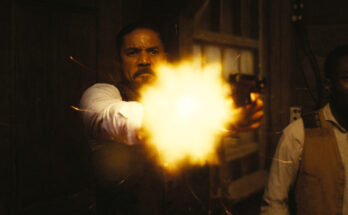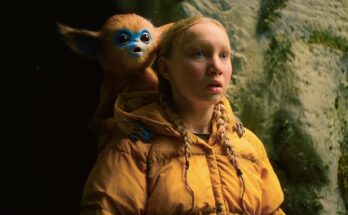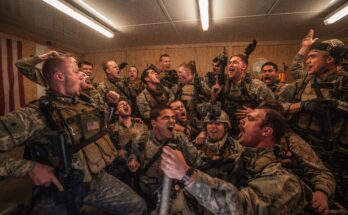Want to hear more from the actors and creators of your favorite shows and films? Subscribe to The Cinema Spot on YouTube for all of our upcoming interviews!
Managing editor & film and television critic with a Bachelor's of Arts in English Literature with a Writing Minor from the University of Guam. Currently in graduate school completing a Master's in English Literature.
The following interview is with filmmaker Elle Callahan. This 15-minute conversation took place on Thursday, March 11th at 3:50 pm Pacific Time. She and I discussed her feature-length horror-thriller film, Witch Hunt, which premiered at the South by Southwest film festival about a week later. Here is The Cinema Spot‘s interview with her.
Introductions
I introduced myself to writer/director, Elle Callahan. I told her that I had intended to conduct the interview with my co-writer, Jordan. Unfortunately, he was unable to make it to the Zoom meeting. We did, however, later publish a co-written review on her film. Without further ado, below are the interview questions I asked, along with her responses.
The Production of the Film and Working With the Actors
John Tangalin: What was your experience during the production of Witch Hunt?
Elle Callahan: [I]t was a fantastic experience. I was fortunate enough to work with very talented actors that brought a lot of their own magic to the set. It was a very cooperative and calm presence. [W]e got to do a lot of fun things, a lot of cool stunts, and just tell a fun story.
JT: There were a lot of intense scenes in your film and, I don’t want to give anything away, but I think what happens to Claire [played by Gideon Adlon] one night kind of freaked me out a little bit. [T]o go a little bit further, what was it like filming with this cast? Because they all seemed really talented in their roles.
EC: It just felt really natural. It felt very cooperative, and they really expanded upon their characters and brought them to life and really added to what was on the [script] page. So it was a really fun experience. … It didn’t feel like work, you know? It was really fun.
The History Behind Witch Hunt
JT: So a witch hunt is obviously reflective of what’s going on in North America today. Are there any other influences behind the conception of this film?
EC: Basically just the history of witchcraft, in general. I’ve wanted to do a film about witches for a long time and … what we know about witches is pretty much limited to the Salem Witch Trials. There’s so much more in terms of their history of being persecuted in Europe and in Asia and in other parts of America. So I wanted to just kind of take that and plop it in [the] modern-day, and it all kind of lined up pretty well. I wanted to do something with magic. I think it’s a fun thing to explore in a film, and it’s a fun thing to watch as a viewer.
Popular Culture Influences Behind Witch Hunt
JT: Yeah, I particularly liked how you made it kind of … for lack of a better [term], like a dystopian type of narrative going on. You do reference a popular film from the 1990s, which your [film’s] ending closely resembles. I also noticed that there is one element from your film that also kind of resembles Wes Craven’s The People Under The Stairs where you have these monsters living behind the walls and you do that, too. Do you think you take inspiration from other maybe pop culture works?
EC: Yeah, I mean, Guillermo del Toro movies are big influences on me. Pan’s Labyrinth – I pulled a lot from, for this movie, in particular with our villain. [For] our color palette, Inglourious Basterds was another big influence in terms of hiding beneath the floor and things like that. Yeah. And then Thelma and Louise has always been one of my favorite movies, and I thought it really lined up to our protagonists’ Claire and Fiona [played by Abigail Cowen] journey, and it was just fun to reference and pay homage to.
JT: I really liked your reference to Thelma and Louise. It felt natural like it felt grounded for me.
EC: Good, I’m glad!
The Younger Children of the Film
JT: Do Corey [played by Cameron Crovetti] and George [played by Nicholas Crovetti] ever get to play with Shae [played by Echo Campbell] at one point? Because I know there is one scene where they reject her and then she’s bummed out about it. [L]ater on in the story, is there a part where we don’t see [her play with them]?
EC: Yeah. Well, they do play with her. She’s just, I don’t want to give anything away, but you might not know that they are.
JT: Oh, we’re talking about *that* scene, right? Where she — Okay.
I realized what scene Callahan was referring to, but you would need to have seen the film to understand this particular context.
Hope for Our Future
JT, con’t.: Do you think your the America [aka] the fictionalized America in your film and/or the America in which we’re living in — will the people in that America will change their minds about their “witch hunt”?
EC: I mean, I’m hoping. I just tried to write something that I saw in the world around me. It wasn’t my intention to have a strong political message, but that’s kind of what happened when I was writing it. [The story] just felt so organic, and it just fit in with what was going on in the news. And hopefully, the viewers will be able to take away a moral from it that isn’t so in their face, but it’s just kind of an undercurrent.
The Future for Film with Callahan
JT: Do you have any other horror films in the works or just anything that’s just coming off as ideas right now?
EC: I have a lot of scripts that I’ve been working on over the past year but obviously [due to the pandemic] nothing was filming. I’m hoping to get one of those into production soon, and I’m definitely going to stay in the genre space. I really enjoy it, and I think … there are a lot of fun and spooky stories to tell, and I hope to keep doing that.
Callahan’s Own Horror Influences
With still some time left, I had no more questions on my list to ask. Although, I was curious as to what Callahan’s personal horror influences are.
JT: What horror movies do you take influence from?
EC: The Witch, I guess, is a big one. It Follows is a big influence on me. I think they … create tension very well in that film, and [in] my films, I don’t use gore, so I try to get my scares from atmospheric tension and that kind of creep that we try to build throughout the film in order to give you that kind of eerie feeling. And I guess The Haunting of Hill House was a big influence on me too. That’s a series, but they have some fantastic scares in there. I took a lot of inspiration from it when I was crafting the scares for Witch Hunt.
JT: So pretty much like the modern horror that’s [been releasing lately].
EC: Yeah. I like the modern horror films —
Defining the Evolution and Progression of the Horror Genre
JT: Not so much the past [or] the nostalgic horror?
EC: Yeah. Well, the thing is when I was young, I didn’t watch a lot of horror films because I was too scared. They scared me too much. And only in my adulthood have I really found that I enjoyed them, and maybe it’s just a shift in the genre, but there were a few films from my childhood that really scared me. I do still today, like try to incorporate parts of those. Like The Ring, I think, is a fantastic movie, and it scared the pants off me when I was little. But I think I just connect more to modern horror films. I think it’s because they usually come with a kind of social message disguised with them, and I like putting those in my films as well.
I thanked Callahan for the opportunity to have the interview, as nervous as I was.
The filmmaker does have some more horror projects in the works, so I do hope to chat again sometime in the future!
For more horror and thriller-related news and reviews, follow The Cinema Spot on Twitter (@TheCinemaSpot) and Instagram (@thecinemaspot_). Also, you can now find us on Facebook (TheCinemaSpotFB)!
You can also check out our review of the film!
Managing editor & film and television critic with a Bachelor's of Arts in English Literature with a Writing Minor from the University of Guam. Currently in graduate school completing a Master's in English Literature.




